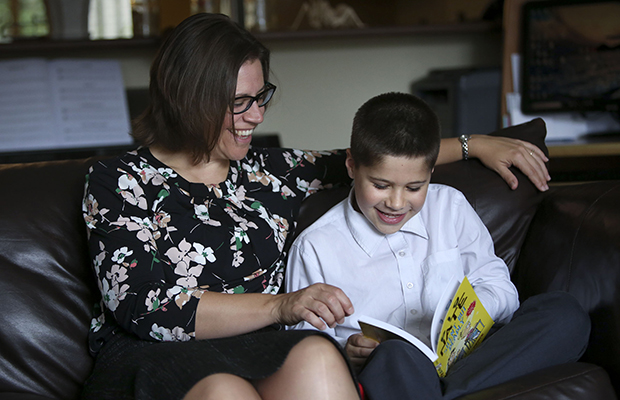Prophetic Direction of New Curriculum Meant to Increase Gospel Joy, Says Religion Professor
Contributed By Robert L. Millet, Church News contributor

Justin Allen, center, reads to his son Tom Allen and daughter Emilia Allen at home in Renton, Washington, on Friday, September 14, 2018.
“Mercifully, our Father in Heaven does not expect those living in our day to face and do battle against moral and spiritual corruption with yesterday’s armor.” —Robert L. Millet, BYU professor emeritus
Related Links
As a religious educator for almost 40 years, I can say without hesitation that the young people I taught in my last year at Brigham Young University in 2014 were much more scripturally literate than those wonderful youth I taught in my first semester there.
The latter group not only knew their Book of Mormon better (largely as a result of President Ezra Taft Benson’s ministry), but they were also much more knowledgeable of and conversant with the Bible. Why?
Beginning in the 1970s the leadership of the Church established an ongoing study in Sunday School of the four books within our standard works. In addition, in the early 1980s, seminaries and institutes shifted from delivering “lessons” to what was called “sequential scripture teaching.”
The focus became the scriptures themselves. I am also persuaded that what is true for college students is also the case for older adults: we have come to better understand and apply the principal messages of holy writ and the teachings of the restored gospel.
Mercifully, our Father in Heaven does not expect those living in our day to face and do battle against moral and spiritual corruption with yesterday’s armor. For that reason, the Lord will not allow His covenant people to coast spiritually.
If I might borrow words spoken by President Spencer W. Kimball: “Now, my brothers and sisters, it seems clear to me … that the Church is at a point in its growth and maturity when we are at last ready to move forward in a major way. … We have paused on some plateaus long enough. Let us resume our journey forward and upward” (“Let Us Move Forward and Upward,” Apr. 1979 general conference).
In a similar vein, President Gordon B. Hinckley counseled the Latter-day Saints to “stand a little taller, to lift our eyes and stretch our minds to a greater comprehension and understanding of the grand millennial mission of this, The Church of Jesus Christ of Latter-day Saints” (“This Is the Work of the Master,” Apr. 1995 general conference).
For many years we have been taught by those charged to guide the destiny of this Church that the family is in fact the most important unit in time or eternity. Constant and consistent efforts to strengthen the family within the walls of our own homes is the most important work we will ever do (see, for example, The Teachings of Harold B. Lee [1996], 280).
“The Family: A Proclamation to the World,” delivered by President Hinckley in 1995, is a godsend. It is essentially the constitution, the prophetic foundational document that sets forth beautifully and informatively why Latter-day Saints place such great emphasis on families.
Ours, however, is a living Church (see Doctrine and Covenants 1:30), and we pay particular attention to living apostles and prophets. Consider the following counsel from our current prophet, President Russell M. Nelson (see Teachings of Russell M. Nelson, 2018, 111–14; emphasis added):
- “The home is to be God’s laboratory of love and service.”
- “In discharging these duties [properly teaching our children], we need both the Church and the family. They work hand in hand to strengthen each other.”
- “Our family is the focus of our greatest work and joy in this life; so will it be throughout all eternity.”
- “The gospel was restored to the earth and the Church exists to exalt the family.”
Keeping these marvelous truths in mind, perhaps we can better appreciate the inspired prophetic direction that has come to us in recent months—to put in place “an integrated curriculum to strengthen families and individuals through a home-centered and Church-supported plan to learn doctrine, strengthen faith, and foster greater personal worship” (Russell M. Nelson, “Opening Remarks,” Oct. 2018 general conference).
As Elder Quentin L. Cook explained, the Brethren “desire to bring greater gospel joy—to parents, children, youth, singles, the elderly, new converts, and those people the missionaries are teaching—through a home-centered, Church-supported, balanced effort” (“Deep and Lasting Conversion to Heavenly Father and the Lord Jesus Christ,” Oct. 2018 general conference).
This and other related articles will focus attention on many of these valuable new resources in gospel learning.
Almost 50 years ago, I sat on the floor in front of a small bookcase in the dining room of our tiny two-bedroom apartment. At this early stage of our life together, my wife, Shauna, and I had been blessed with two children.
This particular evening, I was immersed in reading and referencing and marking; I was engrossed in a writing project, and deadlines were crowding in on me. Interestingly (and ironically), I was at that moment perusing President David O. McKay’s book Gospel Ideals, when our daughter Angela walked over to me and asked me to join her, her younger brother David, and my wife in some games they were playing on the floor about 20 feet away.
I explained to Angie that I was very busy and wouldn’t be joining them. Within three minutes, David ambled over and asked: “Dad, you come play?” I called out to my wife at that point: “Shauna, can’t you see that what I am doing is important? Could you please keep these children out of my way until I finish this project?”
I dove back into my research. Within less than a minute, however, I felt my attention being drawn back to the threesome, almost as if I were being turned about physically. I looked into three sets of eyes, and what I saw was not very settling—there was hurt and, in Shauna’s eyes, a look of disappointment. And then a quiet “voice” came into my mind. Whether it was the enticing of the Holy Ghost or the sweet scolding of conscience, I don’t know. As I sat looking at my little family, that voice spoke simply but boldly: “Behold the plan of salvation!”
I teared up, and in that brief instant there came a whole host of emotions: an elevated perspective, for in a flash I saw and felt things as they really are; feelings of overwhelming love for a trusting wife and beautiful children; and yes, feelings of guilt for neglecting the most important people and the most important enterprise in my life. A rapidly repentant father crawled over to his family and became involved in things that really matter.
I have reflected many times on that singular experience and have thanked God on my knees that in His mercy He chose to “snatch” me (see Mosiah 27:28; Alma 26:17) away from matters of secondary importance. I haven’t always been the perfect husband and father since that red-letter day, but I have been better. I also appreciate the gracious privilege of being reminded and thus tutored periodically by the medium of memory.
The testimony of those “watchmen on the tower” (see Ezekiel 3:17; Doctrine and Covenants 101:45) whom we sustain as prophets, seers, and revelators is that the Savior is leading His Church today. I know that more surely now than ever before.
My hope is that our journey on the covenant path in the days and years to come will be joyous and spiritually invigorating and that each of us may come to enjoy the abundant life promised by the Lord Jesus Christ (see John 10:10).
—Robert L. Millet is professor emeritus of religious education at Brigham Young University.

Jenny Friesen listens as her son Luke Friesen reads at home in Langley, British Columbia, on Sunday, September 16, 2018. Photo by Kristin Murphy, Deseret News.
